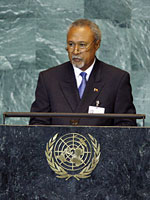Papua New Guinea
H.E. Mr. Puka Temu, Deputy Prime Minister
27 September 2008
- Video: English [RealPlayer - 17 min]
- Statement: English [PDF]
- Back to the list of speakers
Statement Summary

© UN Photo
Click for caption and to enlarge
PUKA TEMU, Deputy Prime Minister of Papua New Guinea, said the world faced formidable challenges, among them the destructive use of illicit small arms and light weapons and the food and energy crises, and he appealed to the General Assembly to respond to the issue of global warming and rising sea levels, which were security issues for small island States that threatened their very survival. Also regionally, he commended the work done so far on the Pacific plan, which could catalyse the region’s development. It was his strong belief that Member States from the Pacific region needed to receive a separate categorization in aggregated data, and in the area of social and economic classification.
At the midway point for the Millennium Development Goals, he said his country was cautiously optimistic. Its successful progress towards the Goals showed a political stability that allowed for long-term development plans, strong partnerships with other Member States and foundations, and steady economic growth in recent years. His country believed that strong partnerships -– the eighth Goal -– was critical to achieving the other seven Goals, and those partnerships must be underpinned by mutual respect. To succeed, partnerships must be significantly scaled up.
Often, he said, the negative was stressed -- environmental degradation, climate change, crippling poverty -- rather than leveraging the positive. His Government’s vision was to transform societal challenges into a framework for sustainable economic growth. It was time to shed the policy chains of the past and create a new paradigm for the future and, on that issue, he wanted to stress three specific points. First, the environment could not be considered an “externality” and the natural environment was not free for society. Second, a broad framework for ecosystem service markets must be created. Third, the natural environment must be viewed as an engine for wealth creation. On the issue of deforestation, for example, it was a complex subject, but put simply “it is driven by the fact the world values forests more dead than alive”. Traditional economic theory -- which considers ecosystem services a common good and thus free to all -- was primarily responsible for the massive loss of the world’s forests.
Global leaders must redraft economic theory and reinvent global markets for a more sustainable future, he said. For example, the latest estimate was that approximately $20 billion a year would be needed to halve carbon emissions from deforestation, but that would be a wise investment, even for that one ecosystem service alone. Forests sequestered some 3.3 billion tons of carbon dioxide annually. In effect, rural communities were subsidizing the carbon emissions of the rich by approximately $100 billion per year -- more than that total of official development assistance annually.
He acknowledged Norway’s great leadership towards the necessary paradigm shift. Norway had stood up against global climate change and had targeted carbon neutrality by 2030. Sharing a similar vision, Papua New Guinea was commitment to reducing their emissions by 50 per cent before 2025 and being carbon neutral by 2050. Concluding, he said the global economy values companies in the billions simply for advertising trinkets while people surfed the Internet. In fact, Google was worth $150 billion, while the world’s last great tropical forests, left standing, were worth nothing. “How can this be right?” he asked. The world’s value frameworks must be reconstructed. At the same time, there was hope, but bold leadership was required on both sides of the economic divide to transform “the way we value our environment and create wealth for rural populations”.
[Source: GA/10757]